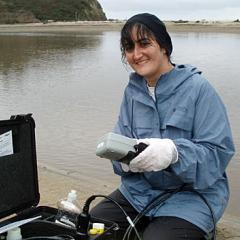Ganguli publishes in PNAS on effects of seal colonization on coastal mercury cycling
Mercury is a potent neurotoxin that accumulates in food webs, posing a global threat to environmental health. Marine mammals are common sentinel species for studying marine pollution; however, their potential role as vectors of contaminants to local ecosystems has rarely been addressed. By quantifying the concentration and chemical form of mercury in seawater affected by Northern elephant seal (Mirounga angustirostris) colonization, we demonstrated here that marine mammal behavioral ecology can substantially influence nearshore mercury cycling. Elevated methylmercury (MeHg) levels in seawater adjacent to the rookery during the molting season may become bioavailable to lower trophic levels, indicating that large marine mammal assemblages represent an important source of MeHg to nearshore food chains and coastal marine fisheries, thereby threatening ecosystem health.
Read more (PDF, less than 1 MB)
Additional Resources
Press coverage of the paper with lead author Jennifer Cossaboon, Priya's former UCSC mentee:
BBC "Science in Action" interview (segment begins at 14:55)
Washington Post: Mercury from the oceans is reaching California’s coasts – and this is the surprising reason why
Science News: Molting seals shed mercury along with fur
